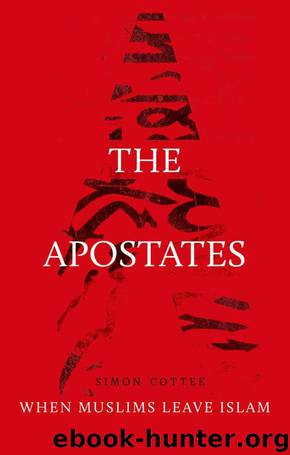The Apostates: When Muslims Leave Islam by Simon Cottee

Author:Simon Cottee [Cottee, Simon]
Language: eng
Format: epub, mobi
Publisher: Hurst
Published: 2015-05-21T16:00:00+00:00
The Great Mistake
In his memoir Joseph Anton, Salman Rushdie recalls that one of the lowest moments during ‘the fatwa years’—on 14 February 1989 Ayatollah Khomeini, the then Supreme Leader of Iran, issued a religious edict declaring The Satanic Verses, Rushdie’s fourth novel, blasphemous and calling for Rushdie’s murder—was when he publicly declared himself to be a Muslim. He had been in hiding for over two years and his life was in turmoil. He was depressed and desperate. So when the offer came he took it. A group of ‘heavyweight’ Muslim intellectuals—Rushdie’s inverted commas—had convened in London to discuss his plight. They would launch a worldwide campaign to lay the fatwa issue to rest, but in return Rushdie would have to publicly proclaim his fidelity to Islam. Otherwise, all bets would be off. And so, ‘trembling with misery’, he signed the document which had been prepared for him. A week later, Rushdie wrote an article, published in both the New York Times and the Times of London, in which he announced:
I should like, however, to say something about my decision to affirm the two central tenets of Islam—the oneness of God and the genuineness of the prophecy of the Prophet Muhammad—and thus to enter into the body of Islam after a lifetime spent outside it…I have been finding my own way towards an intellectual understanding of religion, and religion for me has always meant Islam. That journey is by no means over. I am certainly not a good Muslim. But I am able now to say that I am a Muslim; it is a source of happiness to say that I am now inside, and a part of, the community whose values have always been closest to my heart. In the past I described the furore over The Satanic Verses as a family quarrel. Well, I’m now inside the family, and now Muslims can talk to Muslims and continue the process of reconciliation that began with my Christmas Eve meeting with six Muslim scholars.7
It was all lies. As Rushdie wrote in Joseph Anton, he was ‘a man without religion pretending to be a religious man’. And this made him feel deeply ashamed, because it was a betrayal of who he was and all that he believed in.
Rushdie’s case was unique: a foreign head of state had offered a bounty in his own name as a reward for the murder of a British national. That had never happened before.8 But in lying about his faith in order to save his own skin, Rushdie was joining a long line of persecuted men and women throughout history, who, under threat of death, had to lie about their religious confederation. In the late Ottoman Empire, for example, it was common for Christians to publicly proclaim their conversion to Islam, all the while practising their true religion in the privacy of their homes.9
Among the closeted apostates I interviewed, no one is living in fear for their lives. This isn’t why they’re in the closet. It isn’t the sword of Islam they’re afraid of.
Download
The Apostates: When Muslims Leave Islam by Simon Cottee.mobi
This site does not store any files on its server. We only index and link to content provided by other sites. Please contact the content providers to delete copyright contents if any and email us, we'll remove relevant links or contents immediately.
| Buddhism | Christianity |
| Ethnic & Tribal | General |
| Hinduism | Islam |
| Judaism | New Age, Mythology & Occult |
| Religion, Politics & State |
Cecilia; Or, Memoirs of an Heiress — Volume 1 by Fanny Burney(31324)
Cecilia; Or, Memoirs of an Heiress — Volume 3 by Fanny Burney(30928)
Cecilia; Or, Memoirs of an Heiress — Volume 2 by Fanny Burney(30885)
The Secret History by Donna Tartt(16608)
Sapiens: A Brief History of Humankind by Yuval Noah Harari(13037)
Leonardo da Vinci by Walter Isaacson(11895)
The Radium Girls by Kate Moore(10902)
Sapiens by Yuval Noah Harari(4528)
The Wind in My Hair by Masih Alinejad(4420)
How Democracies Die by Steven Levitsky & Daniel Ziblatt(4392)
Homo Deus: A Brief History of Tomorrow by Yuval Noah Harari(4272)
Endurance: Shackleton's Incredible Voyage by Alfred Lansing(3834)
The Silk Roads by Peter Frankopan(3751)
Man's Search for Meaning by Viktor Frankl(3621)
Millionaire: The Philanderer, Gambler, and Duelist Who Invented Modern Finance by Janet Gleeson(3565)
The Rape of Nanking by Iris Chang(3507)
Hitler in Los Angeles by Steven J. Ross(3431)
The Motorcycle Diaries by Ernesto Che Guevara(3325)
Joan of Arc by Mary Gordon(3253)
